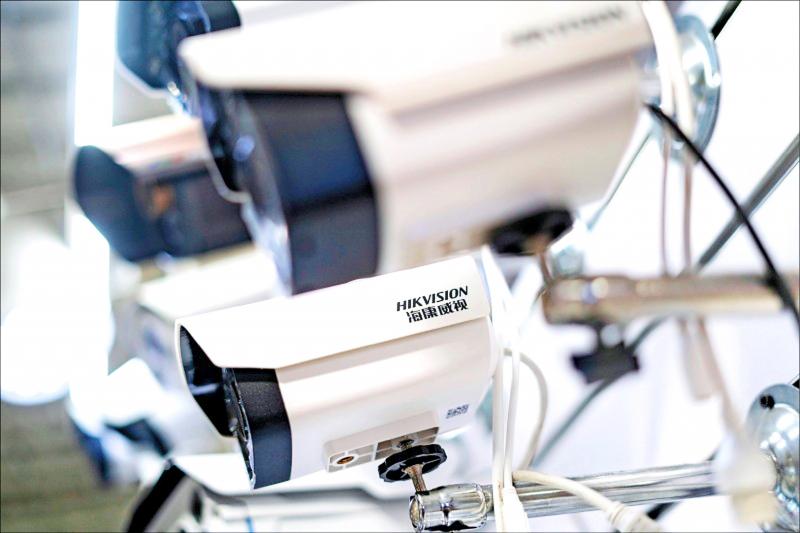An audit of the nation’s public schools found that 1,089 surveillance cameras made by the banned Chinese company Hikvision Digital Technology Co have been used at 16 schools over the past four years, the Ministry of Education (MOE) said yesterday.
The Executive Yuan has yet to release a comprehensive list of banned Chinese products since it pledged to do so nearly one year ago.
That is because the Chinese companies in question have been releasing new products, rendering any such list quickly obsolete, a source said.

Photo: AFP
The Executive Yuan has held interdepartmental meetings to tackle the issue, but failed to reach a consensus, the source said.
One issue is that not all products of some companies pose information security problems, the source said.
The government is concerned that it might cause misconceptions if it banned one or two items from a largely safe manufacturer, the source said.
The Executive Yuan late last month sent a report to the Legislative Yuan about Chinese-made information technology products being used at government agencies.
A majority of the products were made by Hikvision, the report said, adding that a total of 366 devices made by the company were being used by four central government agencies, 15 local government departments and 17 public schools.
A total of 179 of the devices were being used at public schools, the report showed.
However, the ministry’s audit showed that there were 1,089 Hikvision devices on public school campuses — about six times the number reported by the Executive Yuan, the source said.
The finding was particularly worrying for the nation’s information security officials, as Hikvision has close ties with the Chinese government, and its facial recognition technology has been used to suppress China’s Uighur Muslim population, the source said.
A report in July last year by Democratic Progressive Party (DPP) Taichung City Councilor Chiang Chao-kuo (江肇國) on the use of Hikvision cameras in the city’s underpasses was followed by reports of the company’s cameras being used at National Taiwan University, National Sun Yat-sen University and other public schools.
The schools stopped using the cameras after an investigation by the ministry.
However, 13 schools are still using the cameras, citing “no concerns” over the technology, the ministry said, adding that it has written to the schools asking them to stop using the devices to protect students and ensure campus safety.

Taiwan has received more than US$70 million in royalties as of the end of last year from developing the F-16V jet as countries worldwide purchase or upgrade to this popular model, government and military officials said on Saturday. Taiwan funded the development of the F-16V jet and ended up the sole investor as other countries withdrew from the program. Now the F-16V is increasingly popular and countries must pay Taiwan a percentage in royalties when they purchase new F-16V aircraft or upgrade older F-16 models. The next five years are expected to be the peak for these royalties, with Taiwan potentially earning

STAY IN YOUR LANE: As the US and Israel attack Iran, the ministry has warned China not to overstep by including Taiwanese citizens in its evacuation orders The Ministry of Foreign Affairs (MOFA) yesterday rebuked a statement by China’s embassy in Israel that it would evacuate Taiwanese holders of Chinese travel documents from Israel amid the latter’s escalating conflict with Iran. Tensions have risen across the Middle East in the wake of US and Israeli airstrikes on Iran beginning Saturday. China subsequently issued an evacuation notice for its citizens. In a news release, the Chinese embassy in Israel said holders of “Taiwan compatriot permits (台胞證)” issued to Taiwanese nationals by Chinese authorities for travel to China — could register for evacuation to Egypt. In Taipei, the ministry yesterday said Taiwan

Taiwan is awaiting official notification from the US regarding the status of the Agreement on Reciprocal Trade (ART) after the US Supreme Court ruled US President Donald Trump's global tariffs unconstitutional. Speaking to reporters before a legislative hearing today, Premier Cho Jung-tai (卓榮泰) said that Taiwan's negotiation team remains focused on ensuring that the bilateral trade deal remains intact despite the legal challenge to Trump's tariff policy. "The US has pledged to notify its trade partners once the subsequent administrative and legal processes are finalized, and that certainly includes Taiwan," Cho said when asked about opposition parties’ doubts that the ART was

If China chose to invade Taiwan tomorrow, it would only have to sever three undersea fiber-optic cable clusters to cause a data blackout, Jason Hsu (許毓仁), a senior fellow at the Hudson Institute and former Chinese Nationalist Party (KMT) legislator, told a US security panel yesterday. In a Taiwan contingency, cable disruption would be one of the earliest preinvasion actions and the signal that escalation had begun, he said, adding that Taiwan’s current cable repair capabilities are insufficient. The US-China Economic and Security Review Commission (USCC) yesterday held a hearing on US-China Competition Under the Sea, with Hsu speaking on